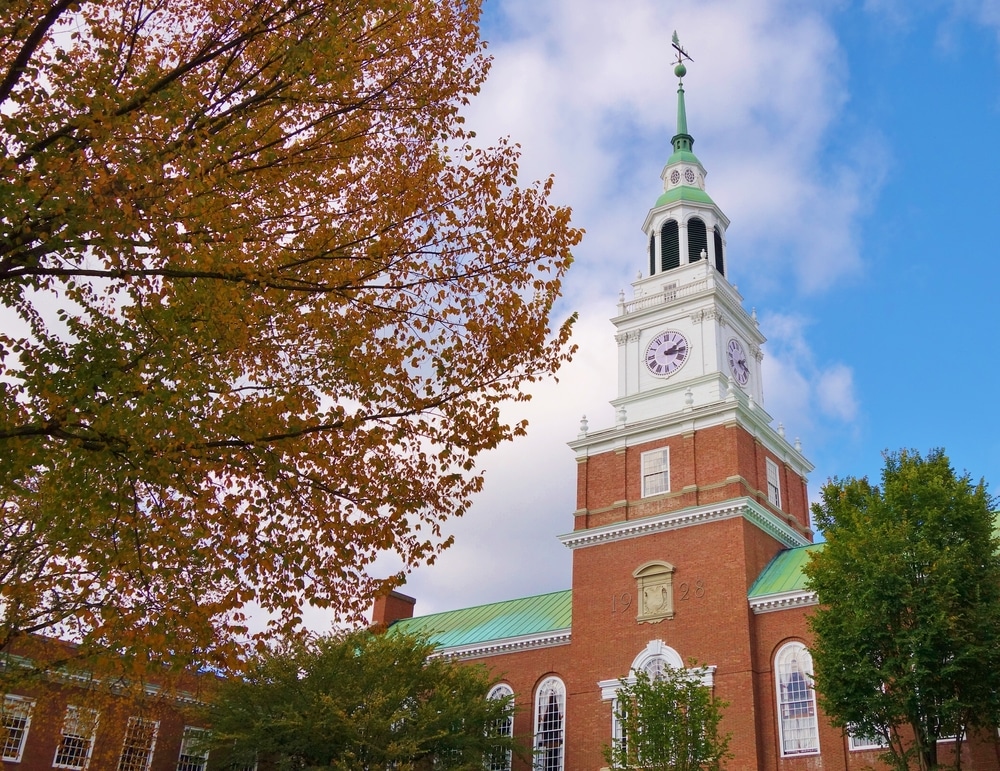Best Classes at Dartmouth
The options can be overwhelming when it comes to finding the best classes at Dartmouth. Dartmouth College is one of the Ivy League schools known for its rigorous academic programs and exceptional faculty.
With a wide range of courses offered each term, it can be challenging for students to determine which classes will provide the most valuable learning experience.
Thankfully, Dartmouth has a reputation for offering some of the best classes in the country, and students have a wealth of options to choose from.
In this blog, AdmissionSight will let you explore some of Dartmouth’s best classes and what makes them stand out from the rest. From small seminar-style classes to large lecture halls, Dartmouth’s diverse selection of courses is sure to satisfy even the most discerning student.
Why do the best courses matter for college admissions?
Navigating the labyrinthine landscape of college admissions is no easy feat in today’s era. As institutions witness record-high application numbers, the criteria for selection become increasingly refined.
In such a milieu, every applicant is eager to identify opportunities that can lend a unique edge to their profile. This is where Dartmouth’s one-of-a-kind courses step in as a potential game-changer.
At its core, education is a journey, a voyage of discovery. Dartmouth recognizes this and has curated an array of courses that stand out, not just in their content, but in the perspectives they offer.
While many institutions provide foundational and traditional courses, Dartmouth’s commitment to pushing academic boundaries ensures students have access to subjects that go beyond the conventional.
Such courses not only pique intellectual curiosity but also allow students to explore multifaceted disciplines, offering a richer, more diverse educational experience.
Choosing to embark on these best academic adventures sends a strong message to college admissions committees. It signals a student’s genuine passion for learning, one that is not tethered to standard curriculums or mainstream subjects.
It reflects an applicant’s courage to venture into the uncharted, question the status quo, and embrace the unfamiliar.
Furthermore, in the eyes of an admissions officer, a student who opts for such courses is not just seeking grades, but genuine growth. They are showcasing adaptability, a trait highly valued in our rapidly evolving global landscape. It also underscores their ability to think critically and approach problems with a fresh perspective.
Moreover, from a long-term viewpoint, these courses don’t just add weight to a college application; they lay the foundation for professional paths that are less traveled.
As the job market becomes increasingly saturated in traditional sectors, there’s a growing demand for professionals who can bring innovative thinking to the table.
Dartmouth’s distinctive courses plant the seeds for such future endeavors, making students more appealing to forward-thinking employers.
For those navigating the tumultuous waters of college admissions, such courses could very well be the anchor that ensures their application stands out in a sea of sameness.
What are the best classes to take at Dartmouth?
What are some of Dartmouth’s most well-regarded academic programs? Most students dread the beginning of a new semester since it means they will have to enroll in a boring general education class.
On the other hand, Dartmouth College offers several courses that are both creative and quite cool, and they are designed so that students may learn while having an amazing and enjoyable experience.
1. TUCK 002 – Introduction to Marketing
This is one of the few non-technical classes offered at Dartmouth that teaches students practical applications that they may use in their future employment, and it is highly recommended.
They will also be prompted to think critically about the commercials and messaging of various businesses they come into contact with daily.
2. Music 11 – Introduction to Opera
Students who enroll in this course will be introduced to Italian opera and music in general, during which time they will come to appreciate and like it even more.
Students typically sign up for Music 11 on a whim, but they quickly realize that it is one of those classes that will enhance their lives for many years.
3. Speech 20 – Public Speaking
As one of the best classes at Dartmouth, both the theory and practice of public speaking will be covered in this class. The students in this course will learn how to organize different types of speeches.
Students will also work on their own and with groups of peers, and they will be actively involved in the preparation and delivery of public speeches at every stage of the process.
4. COLT 1 – Read the World
This course teaches comparative methods designed to confront the misunderstandings and mistranslations that are a part of reading across the world’s languages, locations, cultures, historical periods, and expressive forms.
5. ENGS 12 – Design Thinking
Although enrollment in this course is competitive, it is one of those rare classes that have the potential to alter the way Dartmouth students live their lives and develop their professions.
There are weekly design assignments that are rigorous, in addition to other enjoyable activities that may develop the student’s problem-solving skills, which they can then employ in real-world situations.
They are also allowed to form relationships with the other students in the class.
6. MUS 51 – Oral Tradition Musicianship, aka African and Latin American Drumming
In MUS 51, it is not so much about the material you will learn as it is about the process by which you will learn it and the instructors who will teach it.
Students will get the opportunity to gain insight into the history of music and other general wisdom that the lecturer has gained from their own experiences that are worth hearing.
7. ENVS 2 – Introduction to Environmental Sciences
This course is meant to serve as a general introduction to environmental sciences because many students do not get the opportunity to study the subject in greater depth during high school.
8. CLST 11 – Greek and Roman Engineering and Technology
Those interested in the history of technology or in fundamental old engineering skills that could come in handy during the post-apocalyptic period are encouraged to enroll in this class.
As one of the best classes at Dartmouth, students can find out the solutions to questions, such as “How do you lift a multi-ton obelisk into place when your civilization has absolutely no lifting technology?” and “What kinds of war machines did the ancient Romans and Greeks use, and why were they so successful in using them?”
9. HIST 3 – Europe in Medieval and Early Modern Times
It is highly interesting since it covers a lot of ground in the very significant history of Europe while also providing context for a lot of current events.
Interesting topics that will be covered in this course include the origins of European nation-states, the intellectual and cultural achievements of the Middle Ages and Renaissance, the rise of constitutionalism and absolutism, the economic and technological roots of Europe’s global dominance, as well as the social, political, and religious crises that divided the continent.
10. ENGL 18 – History of the English Language
Students who are interested in learning why the letter k comes before the letter n in the word “knight,” why the letter g in “rough” and “through” is pronounced completely differently, or why “not” may be abbreviated as “-‘nt” should enroll in this class.
ENGL 18 is an extremely interesting class, and by the end, students will have a solid grasp of certain complex (but essential) language ideas.
Are classes at Dartmouth hard?
Are there any challenging courses at Dartmouth? It is common knowledge that Dartmouth College is a difficult school because it is an Ivy League school with stringent academic requirements and a competitive admissions process.
However, the degree of difficulty of particular classes can vary widely based on the topic being covered, the teaching style of the professor, as well as the prior knowledge and level of preparation of the students.
The National Center for Education Statistics (NCES) reports that the typical number of students enrolled in a class at Dartmouth College is 19, which, compared to class sizes at other colleges, is somewhat manageable.
Students can receive more individualized attention while being enrolled in some of the best classes at Dartmouth and engage more closely with their instructors, which can improve their ability to comprehend the content of their lectures and improve their overall academic performance.
Furthermore, Dartmouth boasts a notable retention rate, suggesting that the school provides students with the essential academic support to persevere in their education and reach their aspirations.
Similarly, a significant proportion of students graduate within a few years of joining the program, signifying that they meet the college’s academic standards.
However, to be ready for the rigorous academic demands of the university, Dartmouth expects potential students to show they’ve taken the most challenging classes available in their high schools.
Overall, Dartmouth students are immersed in a nurturing academic environment and equipped with resources to help them thrive in their academics, despite the demanding nature of the institution’s courses.
How do Dartmouth’s courses prepare students for future careers?
In the modern world, where industries and professions are in a constant state of flux, the importance of holistic and forward-thinking education cannot be stressed enough. Dartmouth College, with its rich academic heritage and forward-focused curriculum, offers exactly that.
Here’s a deeper look into how Dartmouth’s courses equip students for their professional futures:
Emphasis on Critical Thinking
Many of Dartmouth’s courses, regardless of their primary focus, incorporate elements that challenge students to think critically.
By analyzing data, questioning assumptions, and engaging in rigorous debates, students develop a mindset that encourages skepticism and curiosity. Such a mindset is invaluable in professions that demand problem-solving and innovative solutions, from business and law to science and technology.
Interdisciplinary Studies
The world’s most pressing challenges today, be it climate change, global health crises, or technological revolutions, require an interdisciplinary approach. Dartmouth’s curriculum recognizes this by encouraging students to take courses across various departments.
By blending the arts with sciences or technology with humanities, students get a more comprehensive view of the world. This diverse knowledge base ensures that graduates can effectively collaborate with professionals from various disciplines, a crucial skill in many contemporary job roles.
Real-World Application
Theory without practice can leave students unprepared for real-world challenges. Dartmouth addresses this by integrating real-world applications into its coursework.
Whether it’s through case studies in business courses, fieldwork in environmental sciences, or internships linked with academic credit, students get ample opportunities to test their knowledge in practical scenarios.
This not only enhances their understanding but also provides them with experiences that can be invaluable in their early careers.
Connection to Potential Career Paths
Understanding how academic knowledge translates to career skills is essential. Dartmouth’s courses often feature guest lecturers from various industries, alumni discussions, and career-centric workshops.
For instance, a student taking a course in computational biology might engage with professionals in biotech startups, offering insights into the entrepreneurial side of science. Such interactions give students a clearer picture of potential career paths and what those jobs entail.
Emphasis on Soft Skills
While technical knowledge is essential, the importance of soft skills – communication, leadership, teamwork, and ethics – can’t be overlooked.
Many Dartmouth courses incorporate group projects, presentations, and ethical discussions, ensuring students are well-rounded and prepared for the multifaceted challenges of the professional world.
The combination of theoretical knowledge, practical experience, and a wide array of essential skills ensures that Dartmouth graduates are among the most sought-after candidates in various fields.
What is Dartmouth known for academically?
What is Dartmouth known for academically? The year-round academic calendar that Dartmouth uses is what sets it apart from other universities.
The “D Plan,” which is the name given to the calendar that Dartmouth uses for its quarter-system, consists of four 10-week terms every year, giving students a considerable level of leeway in their academic schedules.
Students will typically enroll in three classes during each term and graduate. They will need to have completed a total of 35 classes.
Students can choose which academic periods they will spend on campus and the best classes at Dartmouth they should enroll in. The only restriction is that they must successfully complete the necessary classes throughout their four years.
The fields of Economics, Political Science and Government, and Engineering are some of the most popular academic concentrations at Dartmouth.
At Dartmouth, the most common choice of major is unquestionably Economics.
Students spend a significant amount of time in their classes addressing issues pertaining to the real world, such as why women earn less money than men, the appropriate level of spending that the United States government should make on healthcare, and the factors that contribute to income inequality.
Each student in the Economics Department, whether majoring or minoring, will be required to complete an independent research project overseen by a department faculty member.
For students interested in politics, the Department of Government offers a plethora of different options to become involved.
Undergraduate students at Dartmouth College participate in the Paganucci Fellows Program, an eight-week summer program that focuses on assisting businesses in bringing about constructive socio-economic transformation.
At Dartmouth, the major in Biomedical Engineering Sciences has swiftly become one of the most sought-after educational opportunities. Students interested in applying to medical school can do so through the BME Early Application Program at the Geisel School of Medicine (Biomedical Engineering Early Assurance Program).
Up to three juniors are chosen each year to earn early entrance to medical school and additional research time. This opportunity is given to students who have demonstrated exceptional potential.
After reviewing information about the best classes at Dartmouth, a unique conclusion is that students should consider enrolling because of the opportunities for close interaction with world-class faculty and the emphasis on experiential learning.
Dartmouth College prides itself on close relationships between students and faculty. The average class size is just 19 students, and nearly three-quarters of all classes have fewer than 20 students. This means that students have ample opportunity to interact with faculty members and get personalized attention and feedback on their coursework.
In addition, Dartmouth strongly emphasizes experiential learning, with opportunities for internships, research, and study abroad programs. Students can gain hands-on experience in their chosen fields, both in the United States and around the world, and apply what they’ve learned in the classroom to real-world situations.
The small class sizes and emphasis on experiential learning create a unique educational experience that can help students succeed academically and professionally. For these reasons, students should consider enrolling at Dartmouth College if they are seeking a high-quality liberal arts education in a supportive and engaging environment.
If you are considering attending Dartmouth College and exploring its exceptional classes, booking an initial consultation with AdmissionSight is a smart step.
Our admissions experts can guide you in selecting the best Dartmouth classes and creating an academic plan that aligns with your interests and goals.
Don’t hesitate to book your initial consultation today and take the first step toward achieving your dreams!










































